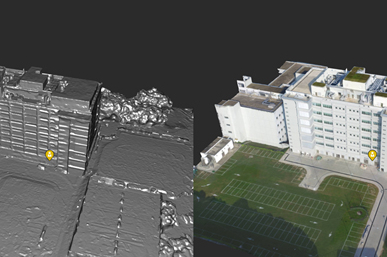
Data Science
2.5 quintillion bytes of data are created every day and as more of the world becomes increasingly interconnected, this number will grow exponentially. Making sense and ultimately uncovering hidden patterns of these vast swathes of data have already opened doors to new business opportunities, smarter cities, health breakthroughs such as targeted healthcare, smarter education and many more impactful avenues. Advancements in data science require the mobilization of artificial intelligence, machine learning and the development of big data and cloud computing platforms. Research into these areas holds the key in deciphering society’s unanswered questions in a more streamlined, systematic, efficient and optimized way than ever before.
HKUST strives to become a pioneer in Big Data and Data Science Research both locally and globally, by spearheading multidisciplinary collaborative research projects, partnering with industry and liaising with technology transfer for big data extraction to develop tangible commercial products.
Key Research Areas

Alan Turing, the father of computer science, first created an algorithm in 1948 for a rudimentary version of computer chess, capable of thinking two steps ahead. Though it fared poorly against chess grandmaster Garry Kasparov, it underpinned the fundamentals of the first artificial intelligent system. With the advent of big data, the applications for AI have since exploded exponentially, involving intelligent robotic systems, natural language processing, data mining, video analysis, large-scale machine learning and speech recognition. HKUST’s finest are collaboratively engaged in these frontier areas.

Data science and big data analysis have the capability of revealing patterns and making connections that would take a human a lifetime to decode. With a system as intricate and complex as a living organism, the availability of big data in healthcare has revolutionized the industry. HKUST scientists are studying the evolution and historical discrepancies in human genetics associated with diseases for targeted precision medicine, genetic farming for a more automated process, and microorganism identification to name a few – using techniques such as deep learning and transductive transfer learning.

Making our city smart is as much of a priority to the Hong Kong Government as it is to HKUST. Our researchers have put their heads together and partnered with various industry leaders such as DiDiChuxing and Thales to tackle the issues of developing smart city applications. A more streamlined and efficient city equates to a more sustainable urban environment, matching the demands of a rapidly growing metropolis such as Hong Kong.

Through research into computer vision, the huge amounts of visual data now available are being usefully mined at HKUST for various applications, such as 3D mapping for assist and rescue missions or expeditions. Others are using computer vision to detect patterns in classroom learning, to predict and identify learning difficulties and develop tools to tackle them.

For every minute of the day, it is estimated that Facebook users like approximately 4.17 million posts. Instagram comes in a close second with 1.74 million photo likes. Once analyzed, this gargantuan amount of data holds valuable information on consumer and demographic behavior for targeted marketing, but more importantly, elucidates direction into the development of emerging applications in cyber-physical environments and societies.

Machine learning, especially deep learning, is at the core of the rapid recent advances in AI. Yet, our fundamental understanding of deep learning has lagged significantly behind. The fundamental questions of why and how deep learning works are very challenging mathematical questions with profound implications for real world applications. For example, how to avoid overfitting, and the curse-of-dimensionality through better understanding of feature selection and representation. HKUST researchers are actively involved in tackling these challenges from a multidisciplinary approach, drawing on our strength in statistics, optimization, analysis, geometry and computation.
Research Highlights
Related Research Units / Programs
- Big Data Institute
- GREAT Smart Cities Institute
- Centre for Artificial Intelligence Research (CAiRE)
- HKUST-Huawei Joint Laboratory
- HKUST-WeBank Joint Laboratory
- MOE/MSRA Information Technology Key Laboratory


